The Interview: Legendary Philanthropist and Ad Man Jack Connors
What would make Boston better? "If the rich people cared about the poor people," says the city's consummate power broker.
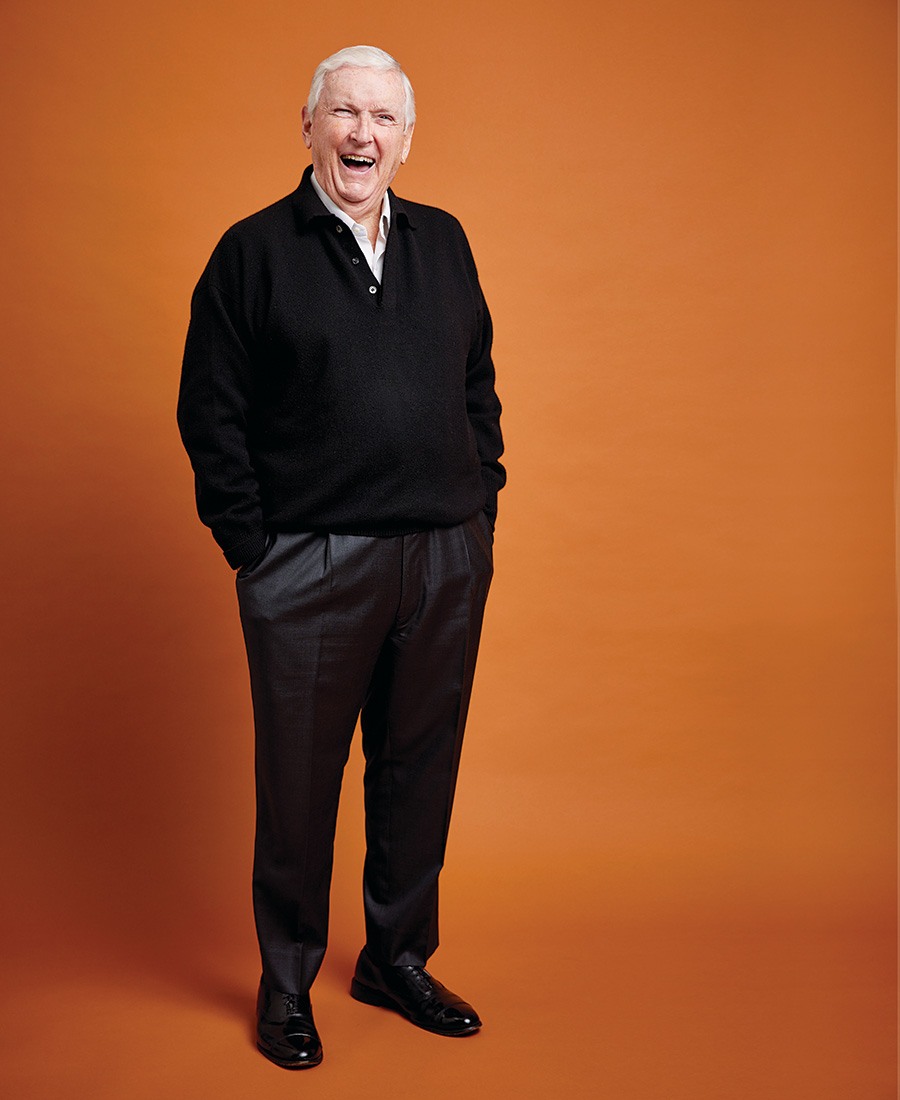
Jack Connors. / Portraits by Ken Richardson
To show his appreciation, Jack Connors, Jr. once took his former third-grade teacher to a Volvo dealership and bought her a car. But if you think that’s the most generous thing the man long described as Boston’s biggest power broker and “the ultimate insider” has ever done, you’d be wrong. Among the founders of advertising giant Hill, Holliday, Connors, Cosmopulos, he has spent the latter part of his career as one of the most impactful philanthropists in the city, most notably with the creation of Camp Harbor View—a summer camp on Boston Harbor’s Long Island that also provides at-home programs for inner-city youth and their families. After leaving the advertising business in 2006 and relinquishing his enviable aerie atop the John Hancock Tower in 2021, Connors moved his family office into a brownstone on Newbury Street—which is where we sat down with him to talk about his days driving a taxi as a BC student, the future of leadership in Boston, and his legacy.
Do you miss your legendary view from the 60th floor?
No. For 41-and-a-half years, I had the privilege of being in the Hancock Tower, on the 39th floor for 30 years, probably, and 11 or 12 years on the 60th. And I saw everything I could imagine, from Mount Monadnock to the Atlantic Ocean. Cargo ships at night. LNG tankers coming through. Airplanes landing. And I don’t need to see it anymore. So I came back down to where the people are. From the 60th floor, they were ants, not people, and I like this better. We’re one block from where, when I was 25 years old, on May 13, 1968, I became one of four cofounders of what was then the world’s smallest advertising agency: Hill, Holliday, Connors, Cosmopulos. So this is kind of like coming home.
Previously: Is Jack Connors the Last King of Boston?
Three adjectives to describe an effective leader?
Bold. Respectful. Generous.
What are your thoughts on the Jack Welch, scorched-earth CEO style?
Jack was a friend of mine, and we thought about and fortunately rejected the idea of buying the Boston Globe for $500 million. He was known, I think, as Neutron Jack. He was cranky, but I loved him. He was effective, and he was certainly bold. I’m not sure how respectful he was, but he had a job to do, and he got it done.
How do you think we nurture more civic involvement among young people?
Unfortunately, we don’t. Today, there’s much less community participation. My dad was in the Knights of Columbus. My mother was in a local women’s Catholic group. I was in the CYO—the Catholic Youth Organization—and the basketball team at the church. Nobody joins those things anymore, or those things don’t exist. Everybody’s gone into silos. If you go into any apartment building in Boston, pick a door and knock on it, and ask whoever answers just two questions—“Have you met anybody else in this building, other than in the elevator by accident? Have you ever had a cup of coffee with them?”—the answer is generally no. Everyone’s now in a fight for survival or success, so how are we going to have time to nurture the next
generation?
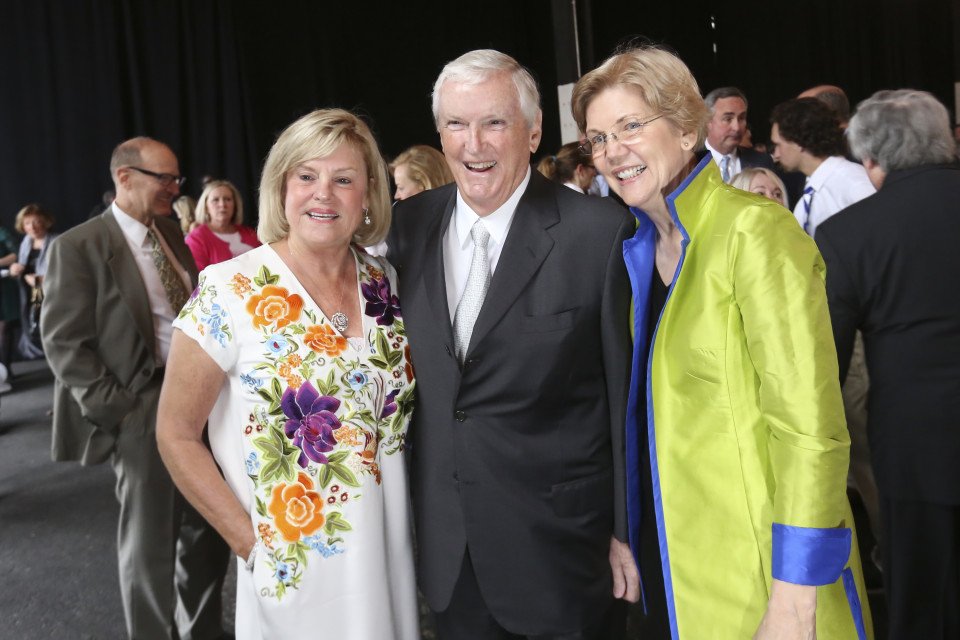
Connors Jr. with his wife Eileen (left) and Senator Elizabeth Warren at Camp Harbor View Gala in 2016. / Photo by Nicolaus Czarnecki/MediaNews Group/Boston Herald via Getty Images
Is there any way to change that?
We change that by coming together and saying, “It’s your turn now.” That’s what Camp Harbor View is about. We had a thousand kids out there this summer. Half of them have probably never seen the Atlantic Ocean but live less than 5 miles away from it. They live in a six-block world. How can they be successful in this country, on this planet, if they only know six blocks? Especially where maybe the biggest, most important person on that block is the drug dealer?
How have you dealt with the demolition of the Long Island Bridge?
We use a ferry. It’s the old Provincetown II ferry, which should’ve been put out of service about 200 years ago, but to these kids, it looks like a cruise ship. And they see things maybe they haven’t seen before. A lobster boat. A sailboat. A freighter. A Coast Guard boat. A seal. If you’ve never seen them, you can’t dream about maybe someday working with them. And the experience on the island is similar.
What do you think the future of leadership looks like in Boston?
Well, it will look different. It won’t be Irish. It won’t be Italian. It won’t be as white. But the important thing is that different is fine. We need to embrace different. There was an article in the newspaper the other day about the professional women’s soccer league franchise we’re getting, and there are four people in the picture. All of them are women. That’s a big change for professional sports. And guess what? We’re all going to be fine.
Do you foresee a power vacuum in the short- or long-term?
No, because I’m an optimist. Now, allow me to give you the definition of an optimist. A guy is shown a barn literally filled, floor to ceiling, left to right, front to back, with manure. And the optimist says, “There’s gotta be a pony in there!”
Who is the person you admire most?
There are lots, but Father Bill Leahy, president of Boston College, Pope Francis, and David McCullough. Those are the Holy Trinity.
Do you have a personal motto?
One that’s clean?
No, it can be profane.
Not really, but I wrote something down recently, which I don’t usually do. It was, “I have nothing left to prove, but I have a lot more to give.” Let’s go with that.
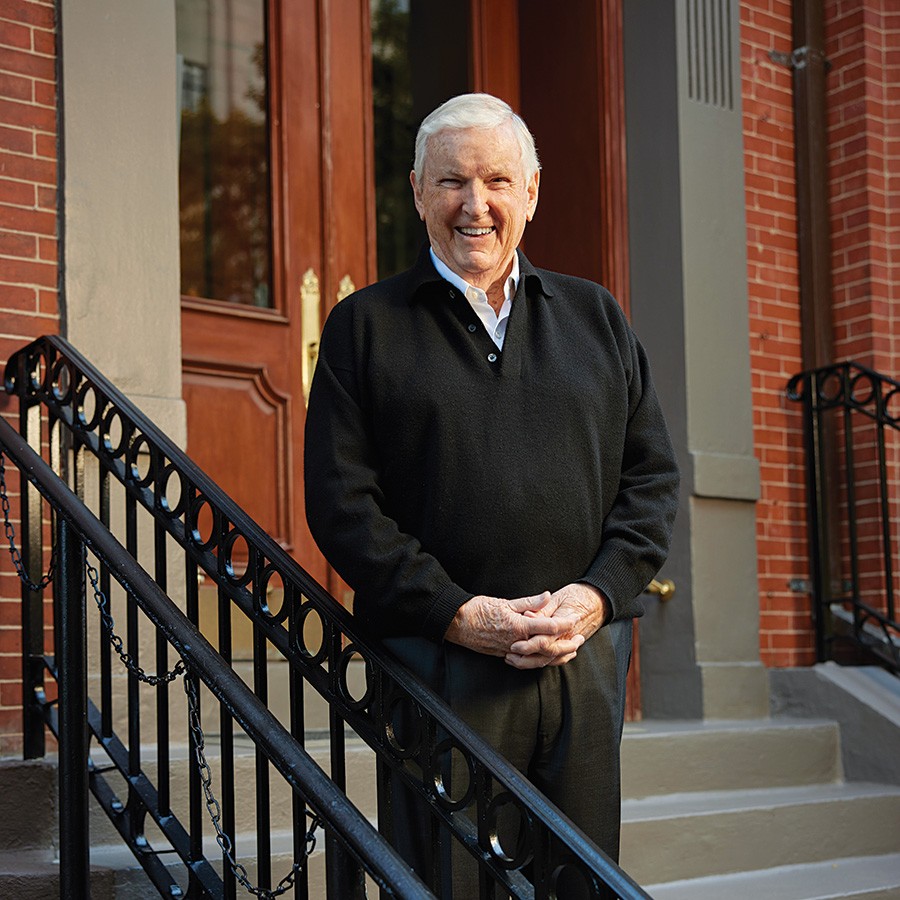
Portrait by Ken Richardson
Who’s the most powerful person in Boston?
I don’t think there’s only one. Power has sort of dissipated. You know, there used to be what was known as the Vault, and the Vault made the decisions and dictated them to the State House. They told the governor and the mayor how things were gonna be. The Vault eventually evaporated, and now the power has been spread out. The quiet power is the guys in the hedge funds, and they have a say and they have a wallet. There’s still some political power, but not the way it used to be. And that’s okay. That’s healthy.
Most pressing inequity that Boston needs to address?
Education. Public school education. It’s embarrassing. To paraphrase Dickens, it’s the best of times; it’s the worst of times. Every top college in the Boston area has the largest endowment it’s ever had. When I went to Boston College, they had maybe half a million dollars. Today, it’s nearly $4 billion. The public schools in the same geographical area are sucking pond water. So the cream—the kids of wealthy men and women—go to BB&N, or Beaver, or Belmont Hill, which cost $50,000 or $60,000 a year. Then the next level goes to the charter schools because their parents care enough to figure out how to get their kids in there. Then there’s a sprinkling of parochial schools, maybe $10,000 a year. Everyone that’s left has two choices: no school or public school.
Did you love school?
I was in love with my third-grade teacher, Miss McCall. After I sold Hill Holliday, I asked if she’d have lunch with me. I was 56, so let’s say she was 76, long retired. I took her to lunch, and we drank a pint. Over lunch, I said, “Can I ask you a question? You knew I was in love with you, right?” She said, “I didn’t know if you were in love with me or my Buick.” So I said, “What kind of car are you driving?” She said, “I’ve got an Oldsmobile. It’s about seven years old.” I said, “Would you mind taking an extra hour? We’re going for a ride.” So I took her to a Volvo dealership and said, “Pick the one you want, on one condition: You’re never allowed to tell anyone about this gift.” She said, “Absolutely.” Before she died about three years ago, according to my record, she had told 32,000 people.
How would you grade the city overall?
I’d give it a B-plus.
What would bring it to an A?
If the rich people cared about the poor people.
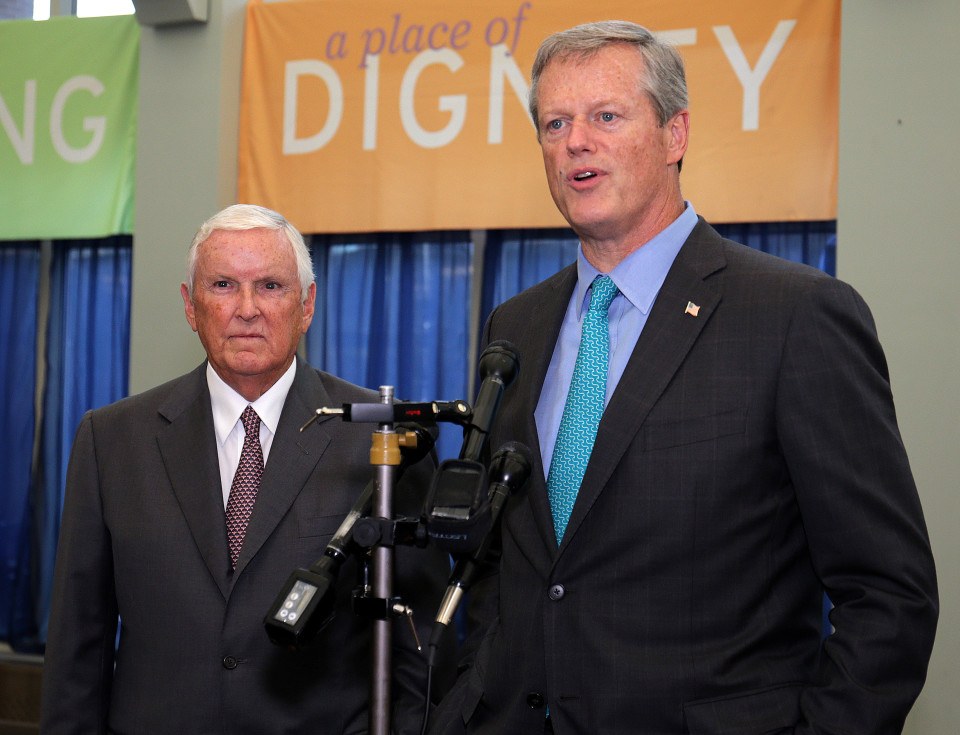
Connors, in 2018, with former Massachusetts Governor Charlie Baker, a Republican whose gubernatorial re-election campaign Connors, a Democrat, chaired. / Photo by Barry Chin/The Boston Globe via Getty Images
What is the best ad jingle or campaign ever, in your opinion?
Oh, you’re tapping into quite a well here. I can take it all the way back to “Use Ajax, bup-bup-bup-bup, the foaming cleanser, bup-bup-bup-bup. Wipes dirt and stains, right down the drain.” I am in love with the advertising business. One of my favorites was for Perdue: “It takes a tough man to make a tender chicken.” Another one was for Sara Lee, which was grammatically incorrect: “Nobody doesn’t like Sara Lee.”
Any you thought were egregiously bad? What was the worst?
Too many to mention. Most of them are bad, especially now, because creative people have been devalued.
As a philanthropist in the city, do you think the government does enough to address the needs that charities address?
I think everybody’s doing the best they can. We just need more.
What’s your guiding principle when it comes to philanthropy?
Steve Bailey, the former Boston Globe business columnist, asked one of my sons: “Why does your father do what he does?” His answer was: “Because he knew it could have gone the other way.” So my guiding principle, I guess, starts with thoughtfulness. Nobody ever said, “That little fella over there in the third row is most likely to succeed.” Never happened.
Do you want your name on any buildings or bridges?
No. My mother’s name is on a building: The Mary Horrigan Connors Center at Brigham and Women’s. But mine? No. That’s not why I do this. I’m not in this for self-aggrandizement. I’m in it because I can and because I should be. It’s very simple.
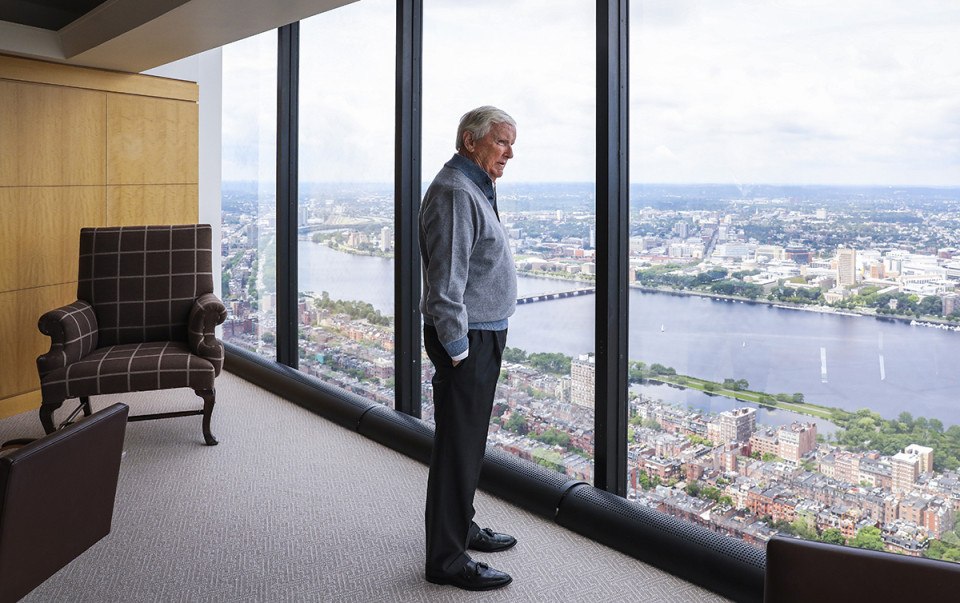
Connors in his Hancock Tower office, where he more than 40 years working, before moving to Newbury Street in 2021. / Photo by Erin Clark/The Boston Globe via Getty Images
You’re often described as the ultimate insider. Name one thing that you knew before everybody else.
A lot of things. [Chuckles.]
Did you ever think about going into politics, and if so, what were you thinking?
Yes, but it was after I was drinking. [Laughs.]
Do you still have your hackney license from when you drove a cab?
I do. Want to see it? [Pulls a framed hackney license from a drawer.] I drove a taxi for two years when I was a junior and senior at Boston College. I wore a limo hat and everything.
How would you describe Boston in 2023?
Halfway there. A world center of intellectual capital. And although Jack Kennedy said, “A rising tide lifts all boats,” it’s not true. We need to lift all the boats.
Favorite secret spot in the city?
Sullivan’s is one. The Forest Hills Cemetery is another. The Arnold Arboretum. My backyard. I guess I have a few of them.
How do you most want to be remembered?
Forest Hills Cemetery is a Victorian cemetery. So many influential people are buried there. It’s beautiful. I walk there all the time. I love to walk, and I attribute my longevity to walking and trying to stay healthy, not to mention stopping drinking a bottle of John Dewar’s scotch every day, which I did 55 years ago. But when I walk through the cemetery, I look at these gravestones. There’s this one guy named Bumpus, and on his gravestone, it says, “He went about doing good.” I said to my wife, “That’s how I want to be remembered.”
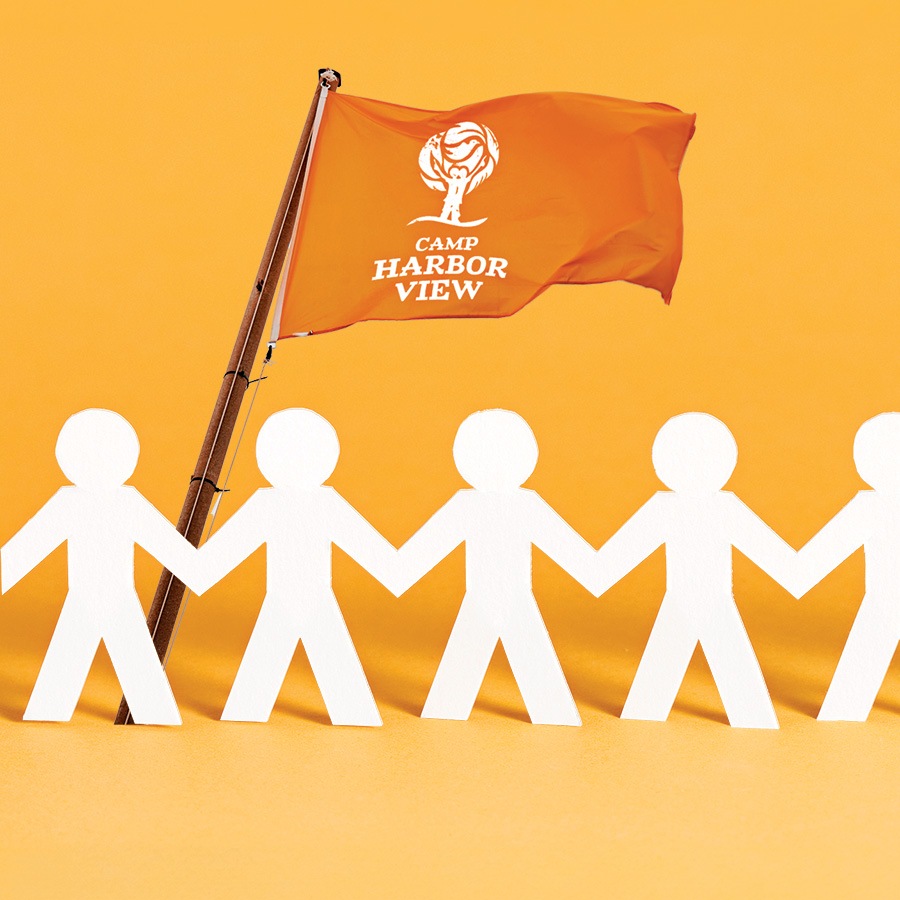
Photo via Getty Images
By the Numbers
Pay It Forward
Money talks, especially when you’re one of the most generous people in Boston.
20,500
Number of kids who’ve been enrolled in Camp Harbor View’s year-round programming since it launched in 2007.
124,000
Approximate amount, in dollars, invested in the family of a child involved in Camp Harbor View from sixth grade through college graduation.
238
Percent increase in Camp Harbor View’s annual fundraising from its smallest year, 2014, to its largest year, 2023.
130 million
Amount, in dollars, raised so far for Connors’s Campaign for Catholic Schools, which focuses on strengthening Catholic education in Boston and other urban communities.
First published in the print edition of the December 2023/January 2024 issue with the headline, “Jack on Jack.”


